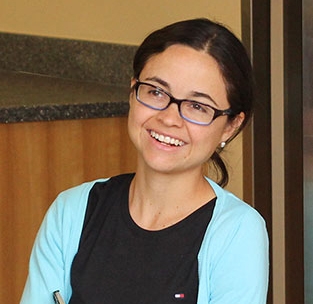Ana Maria Rey of JILA and the National Institute of Standards and Technology (NIST) has won the 2014 Maria Goeppert Mayer Award of the American Physical Society. Rey is one of the world’s top young theoretical physicists. Her specialty is atomic, molecular, and optical physics, an area in which she has shown a remarkable talent for suggesting practical applications of her theory to key experiments. Her hallmark collaborations at JILA and NIST include the fields of ultracold molecules, neutral-atom optical lattice atomic clocks, and quantum simulations. In addition to groundbreaking work at NIST and JILA, Rey collaborates with leading scientists around the world.
Rey is a JILA Fellow, an Associate Research Professor at the University of Colorado, and a NIST Associate. A native of Columbia, Rey joined JILA in 2008 as a CU Fellow whose salary is funded by NIST.
The Maria Goeppert Mayer Award recognizes outstanding achievement by a woman physicist in the early years of her career. The award provides opportunities for Rey to present her seminal work to others through public lectures (in the spirit of Maria Geoppert Mayer). The award consists of $2,500 plus a $4000 travel allowance that will allow Rey to give lectures at four institutions and at the meeting of the American Physical Society at which the award is bestowed. Rey will also receive a certificate citing her contributions to physics.



 The Physics Frontiers Centers (PFC) program supports university-based centers and institutes where the collective efforts of a larger group of individuals can enable transformational advances in the most promising research areas. The program is designed to foster major breakthroughs at the intellectual frontiers of physics by providing needed resources such as combinations of talents, skills, disciplines, and/or specialized infrastructure, not usually available to individual investigators or small groups, in an environment in which the collective efforts of the larger group can be shown to be seminal to promoting significant progress in the science and the education of students. PFCs also include creative, substantive activities aimed at enhancing education, broadening participation of traditionally underrepresented groups, and outreach to the scientific community and general public.
The Physics Frontiers Centers (PFC) program supports university-based centers and institutes where the collective efforts of a larger group of individuals can enable transformational advances in the most promising research areas. The program is designed to foster major breakthroughs at the intellectual frontiers of physics by providing needed resources such as combinations of talents, skills, disciplines, and/or specialized infrastructure, not usually available to individual investigators or small groups, in an environment in which the collective efforts of the larger group can be shown to be seminal to promoting significant progress in the science and the education of students. PFCs also include creative, substantive activities aimed at enhancing education, broadening participation of traditionally underrepresented groups, and outreach to the scientific community and general public.